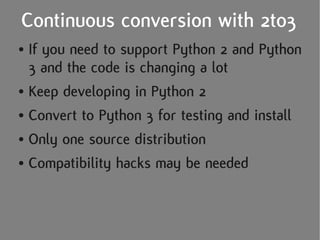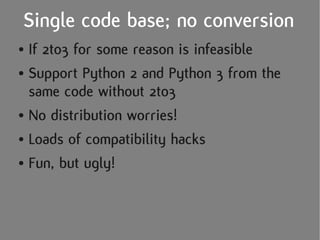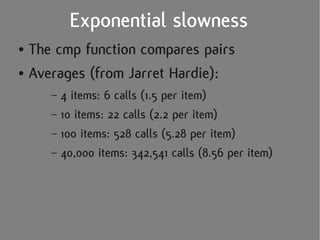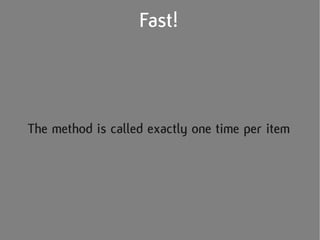Porting to Python 3
- 1. Porting to Python 3 Lennart Regebro EuroPython 2010, Birmingham
- 2. Python 3 is here
- 3. Loads of goodies! ● print is a function ● All strings are unicode ● Binary data handled by new bytes type ● dict.keys/items/values() are generators ● Integers are all long ● 3/2 == 1.5 ● The standard library is reorganized ● New easter egg
- 5. Only support Python 3 ● For end-user software and systems ● Run 2to3 once ● Then fix the code until it works. ● Done!
- 6. Separate branches ● For stable python modules ● If you only do bugfixes ● Make a branch for the old version ● Run 2to3 once ● Fix until it works ● Bug fix both branches
- 7. How to distribute ● Separate package names on pypi ● Add a warning and error in the setup.py: “For Python 2 support, please use version 3.x of MyCoolModule” ● Only release binary eggs (bdist_egg) ● Include both src2/ and src3/ and have different setup() parameters for different Python versions.
- 8. Continuous conversion with 2to3 ● If you need to support Python 2 and Python 3 and the code is changing a lot ● Keep developing in Python 2 ● Convert to Python 3 for testing and install ● Only one source distribution ● Compatibility hacks may be needed
- 9. Solution: Distribute! ● Very little work to set up 2to3 support ● Runs 2to3 on testing and installing: – Only one source tree – Only one distribution
- 10. Using Distribute setup(name='py3examples', ... test_suite='py3example.tests.test_suite', use_2to3=True, convert_2to3_doctests=['py3example/README.txt'], )
- 11. Single code base; no conversion ● If 2to3 for some reason is infeasible ● Support Python 2 and Python 3 from the same code without 2to3 ● No distribution worries! ● Loads of compatibility hacks ● Fun, but ugly!
- 12. When? ● For end-user systems: When you feel like it ● For modules: As soon as you can ● I.e. when your dependencies do
- 13. Preparing for the port
- 14. Get rid of warnings ● Run under Python 2.6 with -3 ● Fix all deprecation warnings
- 15. Use // instead of / In Python 2: >>> 3/2 1 In Python 3: >>> 3/2 1.5 In Python 2.2 and later: >>> 3//2 1
- 16. Prepare for bytes ● Use separate variables for binary data ● Add 'b' and 't' to file flags
- 17. Write tests Increasing your test coverage will simplify porting and increase confidence in the port
- 18. Porting
- 19. Porting with 2to3 2to3 -w . 2to3 -w -d . 2to3 -w -d README.txt
- 20. Common Problems
- 21. Comparisons ● cmp() is gone ● cmp = lambda a, b: (a > b) - (a < b)
- 22. Bytes vs Strings vs Unicode The unicode type is now called string The string type is gone The bytes type handles binary data
- 23. Bytes: ● Used for binary data >>> file = open('maybe_a.gif', 'rb') >>> file.read(6) b'GIF89' >>> b'GIF89'[2] 70
- 24. Solutions >>> import sys >>> if sys.version < '3': ... def b(x): ... return x ... else: ... import codecs ... def b(x): ... return codecs.latin_1_encode(x)[0] >>> b('binaryx67data')
- 25. Still behaves differently >>> data = open('a.gif', 'rb').read() >>> data[2] Python 2: 'F' Python 3: 70
- 26. Wrapper class for Python 2 class bites(str): def __new__(cls, value): if isinstance(value[0], int): # It's a list of integers value = ''.join([chr(x) for x in value]) return super(bites, cls).__new__(cls, value) def itemint(self, index): return ord(self[index]) def iterint(self): for x in self: yield ord(x)
- 27. Wrapper class for Python 3 class bites(bytes): def __new__(cls, value): if isinstance(value, str): # It's a unicode string: value = value.encode('ISO-8859-1') return super(bites, cls).__new__(cls, value) def itemint(self, x): return self[x] def iterint(self): for x in self: yield x
- 28. Usage >>> from bites import bites >>> bites('GIF89a').itemint(2) 70 >>> for x in bites('GIF89a').iterint(): ... print(x), 71 73 70 56 57 97
- 29. Mixed/unknown files ● Open in binary mode, and decode >>> data = open('maybe_a.gif', 'rb').read() >>> if data[:6] != bites('GIF89a'): ... str = data.decode('Latin-1')
- 30. Unorderable types ● Many built in types that were comparable now are not ● __cmp__ is no longer supported
- 31. Use “Rich comparison methods” ● __lt__ ● __le__ ● __eq__ ● __ge__ ● __gt__ ● __ne__
- 32. Doctests ● Binary data now is a b'' literal ● Unicode data no longer has the u'' ● Classes and types have often changed names or at least __repr__ ● Exceptions are formated differently as a result, and exception matching doesn't work under both versions.
- 33. Test with == Go from: >>> myfunction() u'Foobar' To: >>> myfunction() == u'Foobar' True
- 34. Capture exceptions >>> try: ... dosomethingthatfails() ... print “ExpectedException not raised” ... except ExpectedException: ... print “Success” Success
- 35. Without 2to3
- 36. Workaround for stdlib reorg try: from StringIO import StringIO except ImportError: from io import StringIO
- 37. Workaround for except: ● Python 2: except Exception, e: ● Python 3: except Exception as e: ● Both: except Exception: e = sys.exc_info[1]
- 38. Workaround for print() ● For simple print cases: print(“Something”) works everywhere. print(“Something”, “else”) doesn't. ● Make your own print function!
- 40. Don't float ints Python 2: >>> float(3)/2 1.5 Python 2.2 and later: >>> from __future__ import division >>> 3/2 1.5
- 41. Sorting ● Old way: – Needs lists – Slow – Comparison methods ● New way: – Sort any iterable – Fast – Key methods = trivial (often lambdas)
- 42. Old way >>> def lastnamefirst(a, b): ... s = "%s, %s" % (a.lastname, a.firstname) ... o = "%s, %s" % (b.lastname, b.firstname) ... return cmp(s, o) >>> thelist = [Person('Donald', 'Duck'), Person('Paul', 'Anka')] >>> thelist.sort(cmp=lastnamefirst) >>> thelist [Paul Anka, Donald Duck]
- 43. Exponential slowness ● The cmp function compares pairs ● Averages (from Jarret Hardie): – 4 items: 6 calls (1.5 per item) – 10 items: 22 calls (2.2 per item) – 100 items: 528 calls (5.28 per item) – 40,000 items: 342,541 calls (8.56 per item)
- 44. New way >>> def lastnamefirst(a): ... return "%s, %s" % (a.lastname, a.firstname) >>> thetuple = (Person('Donald', 'Duck'), Person('Paul', 'Anka'),) >>> sorted(thetuple, key=lastnamefirst) [Paul Anka, Donald Duck]
- 45. Fast! The method is called exactly one time per item
- 46. Use iterator methods Instead of {}.keys(), {}.values(), {}.items() Use {}.iterkeys(), {}.itervalues(), {}.iteritems()
- 47. Use iterator methods ● In Python 3, {}.keys(), {}.values(), {}.items() are iterators ● 2to3 wraps them in list(), so d.values() becomes list(d.values()) ● By explicitly using iterators in Python 2 code, you avoid the list()
- 48. Put an in in it ● Old: adict.has_key(foo) ● New: foo in adict
- 49. C-code ● There are API changes ● But you can handle them with ifdefs.
- 50. 2 * 3 = Six ● A module to help with compatibility ● Several compatibility methods: – b() – print_() – etc... ● Tons of helpful constants: – integer_types – string_types – etc...
- 51. That's it!
- 52. Comparison Example class ComparableMixin(object): def __lt__(self, other): return self._compare(other, (-1,)) def __le__(self, other): return self._compare(other, (-1, 0,)) def __eq__(self, other): return self._compare(other, (0,)) def __ge__(self, other): return self._compare(other, (0, 1,)) def __gt__(self, other): return self._compare(other, (1,)) def __ne__(self, other): return self._compare(other, (-1, 1,))
- 53. Comparison Example class Orderable(ComparableMixin): def __init__(self, firstname, lastname): self.firstname = firstname self.lastname = lastname def _compare(self, other, truthvalues): try: s = "%s, %s" % (self.lastname, self.firstname) o = "%s, %s" % (other.lastname, other.firstname) value = (s > o) - (s < o) return value in truthvalues except AttributeError: return NotImplemented










![Using Distribute
setup(name='py3examples',
...
test_suite='py3example.tests.test_suite',
use_2to3=True,
convert_2to3_doctests=['py3example/README.txt'],
)](https://image.slidesharecdn.com/portingtopython3-100809023606-phpapp01/85/Porting-to-Python-3-10-320.jpg)












![Bytes:
● Used for binary data
>>> file = open('maybe_a.gif', 'rb')
>>> file.read(6)
b'GIF89'
>>> b'GIF89'[2]
70](https://image.slidesharecdn.com/portingtopython3-100809023606-phpapp01/85/Porting-to-Python-3-23-320.jpg)
![Solutions
>>> import sys
>>> if sys.version < '3':
... def b(x):
... return x
... else:
... import codecs
... def b(x):
... return codecs.latin_1_encode(x)[0]
>>> b('binaryx67data')](https://image.slidesharecdn.com/portingtopython3-100809023606-phpapp01/85/Porting-to-Python-3-24-320.jpg)
![Still behaves differently
>>> data = open('a.gif', 'rb').read()
>>> data[2]
Python 2: 'F'
Python 3: 70](https://image.slidesharecdn.com/portingtopython3-100809023606-phpapp01/85/Porting-to-Python-3-25-320.jpg)
![Wrapper class for Python 2
class bites(str):
def __new__(cls, value):
if isinstance(value[0], int):
# It's a list of integers
value = ''.join([chr(x) for x in value])
return super(bites, cls).__new__(cls, value)
def itemint(self, index):
return ord(self[index])
def iterint(self):
for x in self:
yield ord(x)](https://image.slidesharecdn.com/portingtopython3-100809023606-phpapp01/85/Porting-to-Python-3-26-320.jpg)
![Wrapper class for Python 3
class bites(bytes):
def __new__(cls, value):
if isinstance(value, str):
# It's a unicode string:
value = value.encode('ISO-8859-1')
return super(bites, cls).__new__(cls, value)
def itemint(self, x):
return self[x]
def iterint(self):
for x in self:
yield x](https://image.slidesharecdn.com/portingtopython3-100809023606-phpapp01/85/Porting-to-Python-3-27-320.jpg)

![Mixed/unknown files
● Open in binary mode, and decode
>>> data = open('maybe_a.gif', 'rb').read()
>>> if data[:6] != bites('GIF89a'):
... str = data.decode('Latin-1')](https://image.slidesharecdn.com/portingtopython3-100809023606-phpapp01/85/Porting-to-Python-3-29-320.jpg)







![Workaround for except:
● Python 2:
except Exception, e:
● Python 3:
except Exception as e:
● Both:
except Exception:
e = sys.exc_info[1]](https://image.slidesharecdn.com/portingtopython3-100809023606-phpapp01/85/Porting-to-Python-3-37-320.jpg)




![Old way
>>> def lastnamefirst(a, b):
... s = "%s, %s" % (a.lastname, a.firstname)
... o = "%s, %s" % (b.lastname, b.firstname)
... return cmp(s, o)
>>> thelist = [Person('Donald', 'Duck'), Person('Paul', 'Anka')]
>>> thelist.sort(cmp=lastnamefirst)
>>> thelist
[Paul Anka, Donald Duck]](https://image.slidesharecdn.com/portingtopython3-100809023606-phpapp01/85/Porting-to-Python-3-42-320.jpg)

![New way
>>> def lastnamefirst(a):
... return "%s, %s" % (a.lastname, a.firstname)
>>> thetuple = (Person('Donald', 'Duck'), Person('Paul', 'Anka'),)
>>> sorted(thetuple, key=lastnamefirst)
[Paul Anka, Donald Duck]](https://image.slidesharecdn.com/portingtopython3-100809023606-phpapp01/85/Porting-to-Python-3-44-320.jpg)








